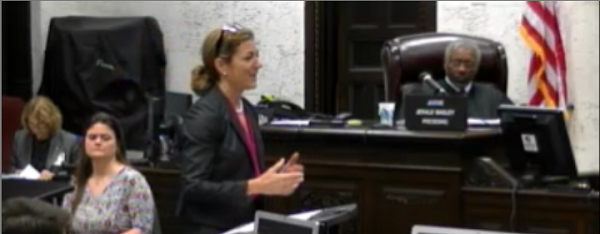
During her opening statement, Elisabeth Culmo tells jurors a faulty maintenance of traffic plan contributed to the 2013 death of executive chef Stefano Riccioletti as he walked to work. Riccioletti's estate is suing the contractors who implemented the plan, The Marks Brothers, Inc. and General Asphalt Co. Inc.
Miami, FL—As trial opened today in the case of a Miami Beach executive chef killed by a drunk driver, attorneys debated whether a construction project’s allegedly faulty traffic maintenance plan helped cause the deadly accident. Gerstein v. The Marks Brothers Inc., 2014-CA-009167.
Stefano Riccioletti, 49, a chef at the South Beach Shore Club Hotel who appeared on television cooking shows in both Italy and the United States, was hit by Karli Tomica, 20, in her Dodge Charger as he walked to work about 6 a.m. January 28, 2013. Riccioletti, who was struck as he tried to pass a roadway construction project, died at the scene.
Tomica, whose blood alcohol level allegedly topped three times the legal limit when the collision occurred, was ultimately sentenced to four years in prison under a plea agreement.
Riccioletti’s estate claims construction contractors General Asphalt and The Marks Brothers Inc., who worked on the Collins Avenue construction project near the accident, contributed to Riccioletti’s death with barricades and confusing detours that caused pedestrians to enter the roadway alongside vehicular traffic.
During Wednesday’s openings, Silva & Silva’s Elisabeth Culmo, representing Riccoletti’s three children, told jurors she would prove Riccoletti died because he was not given a safe, clear path to pass the site. “When you divert motorists or you divert pedestrians away from their normal course of travel, there has to be some logic to it, there has to be some sense to it, there has to be some positive guidance to get through it safely,” Culmo said. “Stefano Riccioletti lost his life as he attempted to negotiate his way past this construction area, on his way to work, with no guidance, with no logic, and with no sense for an effective system for pedestrians to pass.”
Culmo claimed defendants knew before the accident of problems with the maintenance of traffic system, or MOT, intended to redirect pedestrians and vehicles around the site, but did nothing. “Folks on a routine basis simply tried to make their way past (the site) in close proximity to motorists on Collins Avenue, even if it meant riding the line of the highway,” Culmo said.
However, Weinberg Wheeler’s Todd Ehrenreich, representing The Marks Brothers, Inc., a subcontractor on the project, told jurors during openings his client correctly followed the MOT plan designed by state-approved consultants. “Our folks set it up exactly like it was asked for, and it was approved,” Ehrenreich said.
Kubicki Draper’s Peter Baumberger, representing the construction project’s general contractor, General Asphalt Co. Inc., agreed, telling jurors in openings that a Florida Department of Transportation-authorized inspection agent closely monitored and approved the plan’s design and implementation. “He was there every single day. Why? Plans (and) standards,” Baumberger said.
Rather than the MOT, Ehrenreich contended in openings that Tomica was the sole cause of the collision. “What an MOT doesn’t do is prevent drunk drivers from killing pedestrians,” Ehrenreich said, noting Tomica hit Riccoletti after she drifted out of her lane. “The only person to blame is Karli Tomica.”
Trial is expected to continue into next week.
Attorneys for the parties could not immediately be reached for comment.
Email Arlin Crisco at acrisco@cvn.com .
Related Information
Silva & Silva’s Elisabeth Culmo and The Haggard Law Firm's Douglas J. McCarron represent the estate of Stefano Riccioletti. Kubicki Draper’s Peter Baumberger and Jennifer Remy-Estorino represent General Asphalt Co. Inc. Weinberg Wheeler’s Todd Ehrenreich and Noel F. Johnson represent The Marks Brothers, Inc.
Watch Gerstein v. The Marks Brothers Inc. live and on demand.
Not a subscriber?
Learn how you can watch CVN Florida's unparalleled coverage of the state's key trials.





